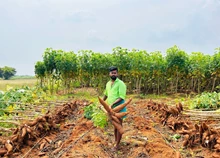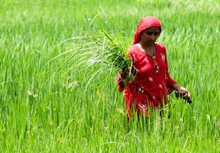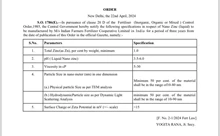
The world faces a rising challenge which is assuring access to clean water. Despite the growing world's population, the most significant water consumer globally is agriculture which must deal with the decrease of water availability. This is water from which the idea of agricultural water productivity (AWP) begins.
AWP does not only increase productivity but also creates other agricultural products. It does this by increasing the amount of crop yield for every water-fed unit. Such a view reversal should not be overlooked in the perspective of water security/food security and its sustainability.
The Urgency of AWP
Sources of fresh water are not in the eluate, whilst agriculture takes the lead with 70% of global water withdrawals according to the Food and Agriculture Organization. Climate change, in addition to the problem above, makes weather worse by changing rainfall distribution and increasing evaporation. Moreover, the world's population is estimated to reach 9.7 billion by 2050 according to the UN projections 2023. This will translate into a serious boost in demand for food, significantly increasing the water stress.
The Benefits of AWP
Increased Food Security: The higher water productivity consequently enables the production of humongous amounts of food with a lesser quantity of water, which seems commensurate with the growing population.
Reduced Water Stress: With that in mind, agricultural water use optimization aims at preserving freshwater surfaces, so that other sectors such as domestic use and industry can also benefit from it.
Environmental Sustainability: The adoption of effective AWP techniques could be used to reduce water pollution by agricultural runoff thereby, improving the water quality of the freshwater bodies.
Economic Benefits: The wise use of water systems in agriculture can help farmers to be more cost-effective and at the same time drop competition for water use in the sectors that need it.
Strategies for Enhancing AWP
There is no one-size-fits-all approach, but several strategies can be implemented to improve AWP.
Precision Irrigation Techniques: Drip irrigation and sprinkler systems where water is delivered directly to the root zone of plants and not spiked into the air to evaporate eliminating the chances of waste in water.
Drought-Resistant Crops: Implementation of the appropriate production varieties that do not demand a lot of water to be applied is of paramount importance in conserving the aquifer.
Improved Soil Management Practices: Mulching and conservation tillage techniques increase water retention thereby decreasing water evaporation.
Investing in Water Infrastructure: Renovation of irrigation canals and fixing leaks during the channeling process can lease water to the ends of the channels.
Conclusion
AWP is not only a concept that refers to technology; it is a strategy to help prove a sustainable future. We can successfully approach this global water challenge through AWP techniques and technologies. Thereby, we would attain food security and pass on our crucial water resources to the upcoming generations for a long time.













Share your comments